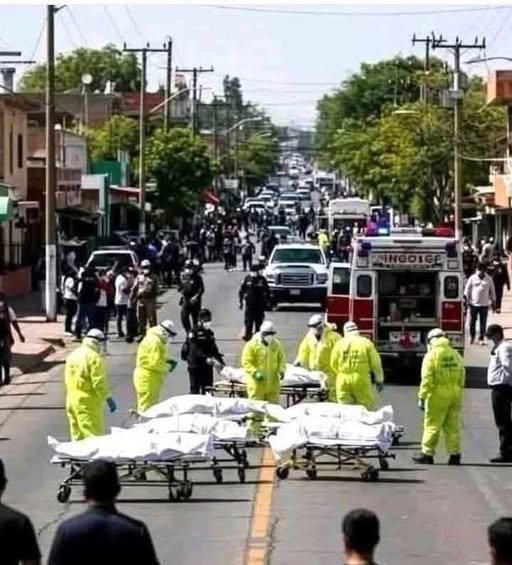A community in Nebraska has been left reeling after a devastating tragedy unfolded on what should have been a day of celebration. Authorities say a Dawson County father is believed to have killed his wife and two teenage sons before taking his own life, all on the morning of his eldest son’s high school graduation.
The Dawson County Sheriff’s Office confirmed that deputies were called to a residence around 9:45 a.m. on May 10. Inside, they discovered four bodies: 42-year-old Jeremy Koch, his wife Bailey, 41, and their two sons, Hudson, 18, and Asher, 16. According to the Nebraska State Patrol, investigators believe Koch fatally stabbed each member of his family before turning the knife on himself. The weapon was recovered at the scene.
A Day of Celebration Turns to Mourning
The violence struck just hours before Hudson, the eldest son, was scheduled to walk across the stage at Cozad High School’s 2025 graduation ceremony. What was meant to be a milestone for the senior class was transformed into a somber reflection of loss.
Superintendent Dan Endorf addressed the tragedy during the ceremony, acknowledging the profound grief hanging over the graduating class. “Our community and our senior class experienced a tragedy within the past few hours,” Endorf told those gathered. “The bittersweet emotions felt by the senior class on their graduation day, and throughout this gymnasium, cannot be concealed in this moment. While our Haymaker pride is being tested, let’s all do our very best within the next hour to celebrate the 13-year journey our graduates are completing today.”
A Family’s Struggles With Mental Health
In the days following the tragedy, Bailey’s parents, Lane and Peg Kugler, issued a public statement expressing heartbreak and frustration at what they described as long-standing gaps in America’s mental health care system. They explained that Jeremy Koch had battled mental illness for more than 15 years, with documented suicide attempts dating back to at least 2009.
In 2015, Bailey and Jeremy had chosen to publicly share their family’s struggles, hoping to reduce stigma and raise awareness about mental health. Bailey, who contributed essays to the parenting site Her View From Home, launched her own Facebook page to discuss their experiences and provide encouragement to others facing similar challenges.
Her writings revealed a long and painful journey. She described how Jeremy’s condition had deteriorated significantly in 2024, leading to multiple hospitalizations and at least four suicide attempts earlier this year. In a candid post from May 3, just one week before the killings, Bailey wrote: “Mental illness is taking my husband from me, and I’m begging you to open your eyes and see the reality that is this society’s mental health crisis.”
She recounted a terrifying moment in March when she awoke to find Jeremy standing over her with a knife, saying, “Something is wrong.” Bailey wrote that she was able to calm him down and convince him to seek professional treatment. However, after discontinuing electroconvulsive therapy earlier this year, she said Jeremy seemed like “a shell of himself.”
An Author and Advocate Silenced
Beyond being a devoted mother, Bailey had earned recognition for her writing and advocacy work. Friends and readers remembered her as compassionate, candid, and deeply committed to breaking the silence around mental health struggles. Many tributes poured in on social media, describing her as someone who gave strength to others even while enduring her own hardships.
“She wanted people to know they weren’t alone,” one former colleague wrote. “It is cruelly ironic that her openness and her courage could not protect her from the very crisis she fought so hard to expose.”
The Community Response
News of the tragedy stunned residents of Cozad and surrounding towns. Vigils quickly formed as neighbors and classmates gathered to mourn Hudson and Asher. Both boys were remembered as bright, kind, and involved in school activities. Hudson, about to graduate, had plans for college. Asher, a sophomore, was described as funny, loyal, and creative.
Local leaders and clergy urged the community to support one another in the difficult days ahead. “This is not something anyone should face alone,” said one pastor. “It’s a time for us to grieve together, but also to recommit to caring for families who may be suffering in silence.”
Broader Questions About Mental Health Care
The killings have renewed debate about the adequacy of mental health services in rural areas like Dawson County. Advocates argue that despite increased awareness, families in crisis often struggle to access timely and effective treatment. Long wait times, high costs, and the stigma surrounding mental illness remain barriers for many.
The Kugler family called for systemic change in their statement, noting that Jeremy’s illness had been documented for years, yet resources to prevent the worst outcomes were inconsistent. “We cannot accept that this is the best our society can do,” they wrote.
Experts say tragedies like this underscore the need for comprehensive care systems that combine medical treatment with community-based support. Crisis intervention, follow-up care, and accessible counseling services are all seen as crucial steps to preventing similar losses.
The Investigation Continues
The Nebraska State Patrol is leading the homicide investigation, and the Dawson County Attorney has ordered autopsies for all four victims. Officials have emphasized that while evidence points to Jeremy Koch as the perpetrator, they are committed to a thorough review of the case.
Law enforcement leaders also highlighted the importance of community awareness around warning signs of mental health crises, including sudden behavioral changes, suicidal ideation, or threats of violence.
Remembering the Victims
As the investigation continues, the focus for many remains on honoring the memories of Bailey, Hudson, and Asher. Friends and family described Bailey as warm and selfless, Hudson as ambitious and hardworking, and Asher as full of joy and creativity.
“They were a family that loved one another deeply, even through hardship,” a family friend said. “We should remember their lives, not just their final moments.”
A Community Searching for Healing
While Dawson County grapples with grief, local organizations are stepping forward to provide counseling and support. Schools have arranged mental health professionals for students, and community groups are hosting forums to discuss both healing and prevention.
For many, the tragedy has become a sobering reminder of the fragility of life and the urgent need to address untreated mental illness. It has also highlighted the resilience of communities that come together in the face of unimaginable loss.
Moving Forward
Though the pain will linger, residents say they hope the legacy of the Koch family can lead to change. Advocates are calling for renewed investment in mental health services, stronger safety nets for families in crisis, and ongoing education about how to recognize and respond to warning signs.
“This cannot be where the story ends,” said one community member at a vigil. “If we truly want to honor their lives, we must ensure other families never have to endure something like this again.”
As the investigation continues and the community grieves, the broader message is clear: mental health must be treated with the same urgency as any physical illness. Without systemic change, tragedies like this will continue to haunt families and communities across the country.




